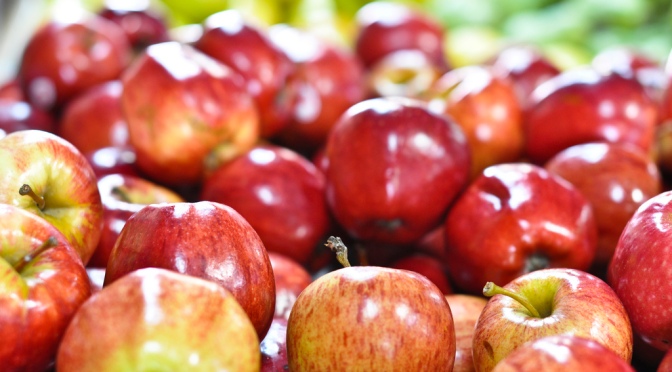 By Dorota Trupp, Nutritionist | A Reblog | According to a new study by the Harvard School of Public Health, eating plenty of brightly coloured fruits and vegetables helps prevent neurological disease. The combination of nutrients in these foods also enhances your brain function, making you a happier, more optimistic person.
By Dorota Trupp, Nutritionist | A Reblog | According to a new study by the Harvard School of Public Health, eating plenty of brightly coloured fruits and vegetables helps prevent neurological disease. The combination of nutrients in these foods also enhances your brain function, making you a happier, more optimistic person.
So, you may ask, what is it about colourful fruits and vegetables that makes them so special? Well, it turns out that a heightened level of antioxidants is the magic ingredient that benefits our neurological health.
Previous studies have pointed to the link between positive brain function and antioxidants, especially vitamin E. The Harvard study focused on a type of antioxidant known as a carotenoid, a natural pigment that gives vegetables and fruits their bright colouring, from yellow through orange, red and deep green. It found that carotenoids have particularly strong health-enhancing qualities – so strong, in fact, that individuals whose diets contained large amounts of this antioxidant were revealed to be more likely to exercise and have an advanced degree!
In addition, when we look at the cultures that consume natural foods rich in carotenoids, we see that they are generally very healthy and experience a lower mortality rate because of chronic illness.
I bet that any parent who reads this will want their children to consume more-colourful veggies and fruits to ensure they have a better start in life!
 Brightly Coloured Vegetables
Brightly Coloured Vegetables
Which fruit and vegetables are the most beneficial?
Any of the brightly coloured fruits and vegetables at your local fresh food market are a good choice. But remember that variety is important. Include on your shopping list vegetables such as carrots, tomatoes, pumpkin, red paprika, sweet potatoes, beetroot, broccoli, kale, spinach, brussels sprouts, asparagus and herbs such as parsley, dill, thyme, coriander and basil. Fruits that are abundant in carotenoids include apricots, mangoes, cherries, strawberries, other berries, citrus fruits and cantaloupe.
This is really just a rough guide. The main thing is that the brighter, more intense is the colour of a plant, the richer is its antioxidant content.
 3-7 servings of colourful vegetables and fruits a day
3-7 servings of colourful vegetables and fruits a day
How many servings do I need to get the full health benefits?
It’s been recommended that you should have somewhere between 3–7 servings of colourful fruits and vegetables each day – the more you have, the better it will be for you!
 A Taste of Happiness
A Taste of Happiness
Should I eat these foods raw or cooked?
All fruit should be consumed raw, when it is at its ripest – this is when it will contain the highest levels of antioxidants and vitamin C. The best option is to buy naturally ripened fruit from your local farmers market or organic grocery store.
Some of the vegetables mentioned above may need to be cooked to make them easier to digest. When you do this, add some butter from grass-fed animals, which is also abundant in antioxidants such as vitamins A, D, E and K2. In salads, you can use extra virgin olive oil, which contains vitamins E and K. To maximise the bioavailability of the antioxidants in vegetables, don’t forget to mix them with ‘good’ fats, such as those found in animal-sourced fats, nuts and unprocessed vegetable oils.

http://www.truppcookingschool.com/blog/
Images: Lead Photo; A Google Image. All other images by: The Trupp Cooking School
References
Ryan Jaslow, ‘ALS risk reduced by eating brightly coloured vegetables, study suggests’, CBS News, 29 January 2013, http://www.cbsnews.com/8301-204_162-57566420/als-risk-reduced-by-eating-brightly-colored-vegetables-study-suggests/
EurekaAlert!, ‘Eating bright-colored fruits and vegetables may prevent or delay ALS’, 29 January 2013, http://www.eurekalert.org/pub_releases/2013-01/w-ebf012513.php
………………………………….
Bloglink: http://www.truppcookingschool.com/blog/2013/07/23/the-colours-of-good-health/






